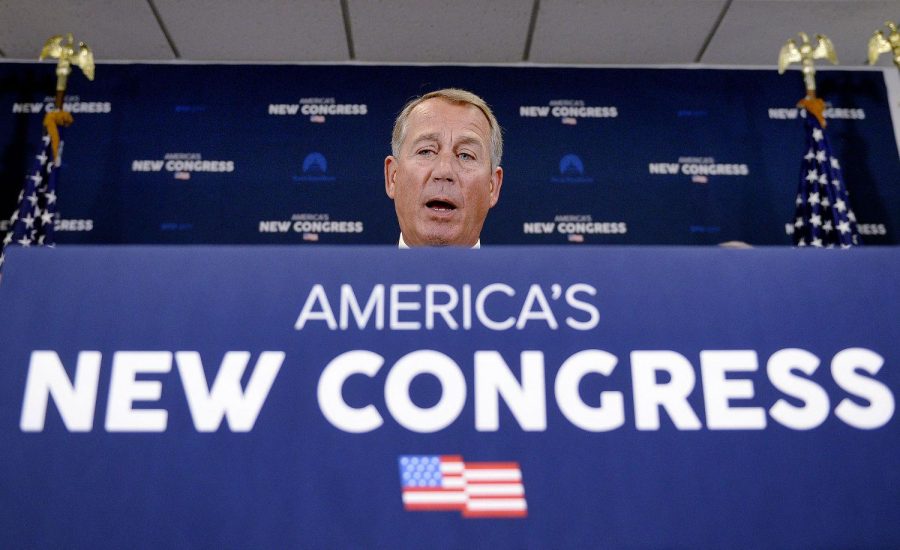Encouraging discretion: Countering overregulation in the 21st century
January 11, 2015
With the 114th Congress now in session, citizens must evaluate the effectiveness of modern legislation.
Attorney Philip K. Howard’s 1994 book, “The Death of Common Sense,” discusses the harmful nature of an overly regulated society. He calls for a return to greater human discretion in our regulatory and legal system.
More than 20 years later, his message is as important as ever.
Today, overly detailed federal regulation continues to hamper economic competition and individual freedom in American society. As a nation, we must return to more flexible legal principles to sustain fair economic opportunity.
Government initiatives during the New Deal era led to substantial growth of the federal government. However, it was during the 1960s when legislation became increasingly detailed, designed in an attempt to foresee every possible problem in society and fix it without need of human interference or discretion. As Howard maintains, although this was contradictory to a legal system based on flexibility, Americans generally welcomed this seemingly rational approach to executing law as a symbol of success. This micromanagement of the state in nearly every societal affair, however, is not progress.
As Howard notes, it took 28 pages to detail the Federal Aid Highway Act of 1956, which gave us our interstate highway system — one of the largest post-WWII public works. Compare that with modern transportation legislation, such as the GROW AMERICA Act, which comes to about 350 pages, and the MAP-21 Reauthorization Act, which also totals in the hundreds. And, in size, these pale in comparison to modern thousand-plus page bills, such as the Affordable Care Act, which totals more than 2,400 pages.
So, we must ask: How are Americans supposed to know their own laws if they are so detailed and massive that most legislators can’t even tell you what’s in them?
As Howard asks, “What good … is a legal system that cannot be known?”
And who pays the price? Not the big corporations that many big government supporters supposedly aim to curtail. Rather, as Howard maintains, “The main victims are small enterprises, poorer segments of society, and the spirit of ingenuity on which this country achieved its greatness.”
The problem here is that lawmakers too often buy into the fallacy that overly detailed law and legislation produces the most fair and effective legal, regulatory and governmental system possible.
Excessive regulation does not level the playing field and improve economic opportunity. Rather, it levels competition between businesses. It does not help common people — it disempowers them. An individual or small business does not have the resources to comply with overly burdensome and detailed mandates as a large corporation could.
Take the Affordable Care Act. According to Politico, it’s more difficult for small business owners to follow an act’s rules and requirements, since they don’t have large human resources departments to assist them, than it is for bigger businesses. The Act’s employer mandate fines businesses with more than 50 employers who do not provide health insurance to their employees. But many businesses employing only slightly more than 50 employees cannot afford to provide the insurance or be taxed. How can they survive? If they can’t, then how will such a policy help their newly unemployed workers?
Today, some politicians are starting to realize this. As Rep. Paul Ryan, R-Wis., said in July 2014: “Regulation keeps the competition out. Many times they [big business] don’t oppose new regulations; instead, they help write them.”
This is not an attack on corporations or larger enterprises. They have every right to legally practice and economically succeed. However, government should create the fairest economic environment for all, in which all levels of society can freely flourish. Over regulation prevents such flourishing and inhibits economic justice.
Strict, detailed regulation isn’t always beneficial to middle class Americans since, naturally, government intiated unyielding uniformity of law is often stacked against them.
Instead of continually throwing overly detailed regulations at the American people, lawmakers must approach law as common law says to, with pragmatism and discretion.
The Interstate Highway System was conceived out of federal legislation. But the 28-page federal bill provided a framework, not a word-for-word mandate. The federal government gave states much of the ownership and operation of the highways, while human minds were put to work to improve the project through the years. After all, problems are best solved when solved by those closest to them.
Laws are only as good as those who interpret and enforce them holistically and flexibly, rather than narrowly and rigidly — which excessive regulation dictates.
In the 21st century, Americans must address the over-reliance on strict, unbending regulation and welcome a return to greater discretion of the American people. Legislatures should enact smaller and cleaner legislation.
Above all, let us limit the excessive over-regulatory output of our governmental legislative factory. Using Attorney Philip Howard’s message, let us resurrect and restore our national common sense.
Matt is the Opinions Editor of The Pitt News and primarily writes about law, national politics and public policy.
Write to Matt at [email protected].



